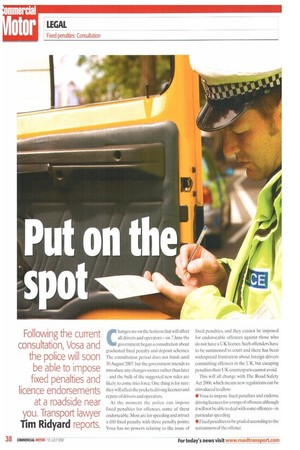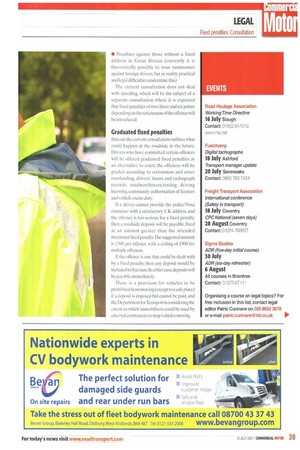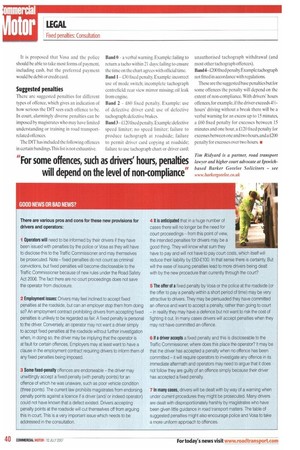Put on the spot
Page 38

Page 39

Page 40

If you've noticed an error in this article please click here to report it so we can fix it.
Following the current consultation, Vosa and the police will soon be able to impose fixed penalties and licence endorsements at a roadside near you. Transport lawyer Tim Ridyard reports.
Changes are on the horizon that will affect all drivers and operators on 7 June the government began a consultation about graduated fixed penalty and deposit schemes. The consultation period does not finish until 30 August 2007, but the government intends to introduce any changes sooner rather than later and the bulk of the suggested new rules are likely to come into force. One thing is for sure: they will affect the pockets, driving licences and repute of drivers and operators.
At the moment the police can impose fixed penalties for offences, some of them endorseable. Most are for speeding and attract a £60 fixed penalty with three penalty points. Vosa has no powers relating to the issue of fixed penalties, and they cannot be imposed for endorseable offences against those who do not have a UK licence. Such offenders have to be summoned to court and there has been widespread frustration about foreign drivers committing offences in the UK, but escaping penalties their UK counterparts cannot avoid.
This will all change with The Road Safety Act 2006, which means new regulations can be introduced to allow: • Vosa to impose fixed penalties and endorse driving licences for a range of offences, although it will not be able to deal with some offencesin particular speeding • Fixed penalties to be graded according to the seriousness of the offence • Penalties against those without a fixed address in Great Britain (currently it is theoretically possible to issue summonses against foreign drivers, but in reality practical and legal difficulties undermine this) The current consultation does not deal with speeding, which will he the subject of a separate consultation where it is expected that fixed penalties of two, three and six points depending on the seriousness of the offence will be introduced.
Graduated fixed penalties Instead, the current consultation outlines what could happen at the roadside in the future. Drivers who have committed certain offences will be offered graduated fixed penalties as an alternative to court; the offences will be graded according to seriousness and cover overloading, drivers' hours and tachograph records, roadworthiness/testing, driving licensing. community authorisation of licences and vehicle excise duty.
If a driver cannot provide the police/Vosa examiner with a satisfactory UK address, and the offence is too serious for a fixed penalty, then a roadside deposit will be payable, fixed at an amount greater than the intended maximum fixed penalty.The suggested amount is OW per offence with a ceiling of 1900 for multiple offences.
If the offence is one that could be dealt with by a fixed penalty, then any deposit would be included in that sum. In either case, deposits will he payable immediately.
There is a provision for vehicles to be prohibited from. moving (except to a safe place) if a deposit is imposed hut cannot be paid, and the Department forTransport is considering the extent to which immobilisers could be used by external contractors to stop vehicles moving. It is proposed that Vosa and the police should be able to take most forms of payment, including cash, but the preferred payment would be debit or credit card.
Suggested penalties
There are suggested penalties for different types of offence, which gives an indication of how serious the DtT sees each offence to be. In court, alarmingly diverse penalties can be imposed by magistrates who may have limited understanding or training in road transportrelated offences.
The DT has included the following offences in certain bandings.This list is not exhaustive. Band 0a verbal warning. Example: failing to return a tacho within 21 days; failing to ensure the time on the chart agrees with official time. Band! -DO fixed penalty. Example: incorrect use of mode switch; incomplete tachograph centrefield: rear view mirror missing; oil leak from engine.
Band 2 £60 fixed penalty. Example: use of defective driver card; use of defective tachograph; defective brakes.
Band 3-&l20 fixed penalty. Example: defective speed limiter; no speed limiter: failure to produce tachograph at roadside; failure to permit driver card copying at roadside; failure to use tachograph chart or driver card; unauthorised tachograph withdrawal (and most other tachograph offences).
Band 4-f200 fixed penalty. Example:tachograph not fitted in accordance with regulations.
These are the suggested base penalties but for some offences the penalty will depend on the extent of non-compliance. With drivers' hours offences, for example, if the driver exceeds 4i/2 hours' driving without a break there will be a verbal warning for an excess up to 15 minutes, a £60 fixed penalty for excesses between 15 minutes and one hour, a £120 fixed penalty for excesses between one and two hours, and af200 penalty for excesses over two hours. •
























































































































































































